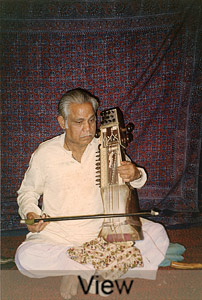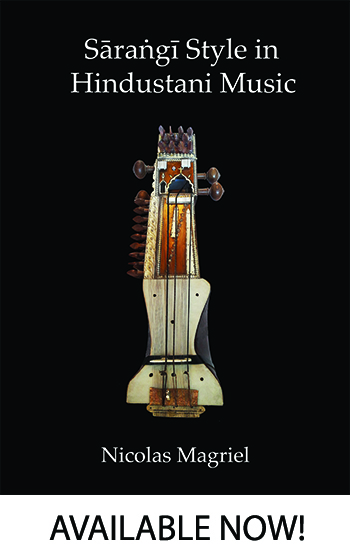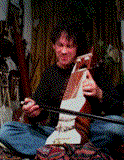
Pandit Bacccha Lal Mishra was one of the last outstanding sarangi players of Banaras (Varanasi). I learnt from him during my stay in Banaras in 1994, and so I have several videos of lessons as well as performances including a concert which I organised for him at Amar Bhavan in the Spring of 1994. He was a sweet and gentle man with a beautiful touch—especially for playing purab ang thumri and all the other "semi-classical" specialities of Banaras, such as dadra, chaiti, hori and kajari.
Baccha Lalji lived in Ramapura, the second-largest musicians' neighbourhood of Banaras, next door to his brother, the tabla player Ishwarlal Mishra, and very close to the houses of the great vocalist Mahadev Mishra and the sarangi player Santosh Mishra, son of Bhagwan Das Mishra. Being without any sons and daughters, he was a somewhat tragic figure. The other residents of his house were mainly relatives of his wife—her brother and his wife and family. But there was an extraordinary 95-year-old woman, Baccha Lal's grandmother, who I knew simply as "Dadiji". Although untrained in music, she had heard an extraordinary amount of music throughout her life and had retained a lot. She taught me many beautiful song compositions, chaitis and holis. She was unversed in sargam (oral notation), so her teaching style was eccentric and wildly intense—repeatedly yelling out the lyrics until they stuck in my mind.
Our video selection begins with four items from a concert which I organised at Amar Bhavan, Assi, Banaras on December 18, 1993. We start with the second item. Due to a power failure (a daily occurence in Banaras) the first item, rag Madhukauns, was performed in the dark. It was followed by rag Kamod:
This was followed by a beautiful bol banao thumri in rag Manj Khamaj, "jaag pari mai to piya". Singing with fingers.
The next item was a chaiti, one of the light classical specialities of Banaras, sung in the month of Chait, Springtime.
Finally Baccha Lalji played thumri in Bhairavi.
Now I present some videos of Baccha Lalji at home teaching. First rag Jaunpuri on January 24, 1994:
Then four pieces from February 5, 1994. We started with rag Jog:
Then Shri Rag:
Followed by Tilang in thumri style:
Then Darbari:
Next two pieces from a recording session in a Christian monastary in Christ Ganj, fifteen miles outside of Banaras, organised by the head of the outstanding company India Archive Music, Lyle Wachovsky, on February 2, 1994. The recording session was plagued by various technical problems. The first recording below, rag Maru Bihag, is incomplete:
This was followed by thumri in rag Manj Khamaj, jaag pari mai to piya:
Now a brief look at the instruments of the house and of its students laid out for blessing on Saraswati Puja, February 15, 1994. Baccha Lalji's mother-in-law, who we called "dadiji" sang a Saraswati vandana in rupak tal (a count of 7). Sadly the camera malfunctioned during the antara of the song. Dadiji was in her nineties, a forminable example of a woman from a traditional music family. She knew hundreds of song compositions in various rags and genres, learned completely through lifelong exposure. She had never been taught music. Towards the end of the video she explaines her familial relations with the family of Hanuman Prasad Mishra and Kabir Chowra musicians. Then we hear some song from the pet parakeets.
Our next selection of four videos comes from a solo concert on February 21, 1994 at the Ganga Mahal, a beautiful but faded palace in Assi, Banaras now in an incarnation as a rooming house for foreigners. The concert was well-attended by a largely Western audience.
The first offering was of rag Yaman:
Then came rag Shri. Baccha Lalji was feeling inspired—playing two long renditions of grand serious rags in one sitting.
Next came a thumri in Pilu.
The programme concluded with a sweet kajri, a Banaras semi-classical speciality associated with the rainy season.
The next piece is a lesson in Bhairavi, the thumri "babula mora", in which Baccha Lalji also sang the thumri. This was on April 14, 1994:
Context! Enjoy a glance at the gali outside Baccha Lalji's house in Ramapura. This was filmed on March 26th, 1994:
Now we have two videos of a rather chaotic event that Baccha Lalji organized on the 20th of April, 1994, bringing a few of his students tohether— Bernardo Rozboz, the son of his wife's brother and myself. Dadiji, his profoundly knoeledgable mother-in-law was also in attendance. Firstly the emsemble played rag Jog, followed by Kirwani:
The following shows some more assorted goings-on at this get-together. The highlight is Dadiji singing:
Let us turn our attention to Baccha Lalji in his professional role as an accompanist of vocal music. First we have three videos of him accompanying the well-known Banares singer Mangala Trivedi at Durga Kund, Banaras in a music festival organized each tear by the Hanuman Prasad Paddar Andhe Vidyalay (blind school). First she sang rag Bihag:
Then Hamsadhvani (a rag originally borrowed from Carnatic music by the great Amir Khan):
And finally rag Paraj. At the beginning we see the great singer Mahadev Prasad Mishra being led into the venue.
The next item is from the presigious Sankat Mochan Sangeet Samroha on the 30th of April, 1994. Baccha Lalji accompanied Sangita Chaturji singing a bhajan in Bhairavi and more:
Now we return to Baccha Lal Mishra as a teacher. Here he teaches me a thumri-style rendition of rag Jogiya on 7 November, 1996:
Followed by rag Jog:
Tuning and talking on November 11, 1996:
After which Baccha Lalji tought me the popular Khamaj thumri "kaun gali gayo shyam":
The next two videos are of a lesson in Pilu thumri-playing on November 15, 1996. The first includes tuning and talk about guru problems while we drink tea—as well as transmission.
The lesson concludes with an extended session of playing, ending with Baccha Lalji telling me the words of the bol banao thumri which we had been working on, and discussing the importance of bringing out the words on the sarangi. Towards the beginning of the recording Baccha Lal Mishra laments that nowadays fewer and fewer people are singing thumri in Pilu.



